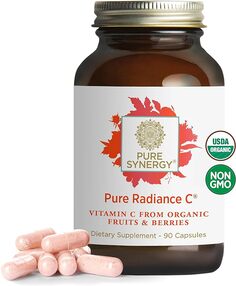Vitamin C is a water-soluble essential vitamin that can be found in fruits and vegetables, especially citrus. Humans are unable to synthesize vitamin C from their bodies, so it must be acquired through dietary intake. Vitamin C is important for immune system function and is a powerful antioxidant. It also acts as a cofactor for collagen synthesis.
People often supplement with vitamin C when they have a cold. According to various studies, vitamin C may be effective in reducing the duration of a cold, but does not seem to reduce the frequency of colds in a population.[1][2] The available literature suggests that a dose ranging from 200 mg to 2,000 mg could be beneficial for reducing cold duration.
Often utilized for its antioxidant effects, vitamin C has been studied for its potential role in Alzheimer’s disease and cancer. Lower vitamin C levels are present in people with Alzheimer’s, even with adequate dietary intake.[3] It is thought that oxidative stress plays a major role in the pathogenesis of the disease, so vitamin C’s antioxidative effects could be beneficial.[4][5] In rodent studies, oral vitamin C was able to reduce oxidative and inflammatory biomarkers.[6] In recent cancer research, vitamin C was found to promote oxidative stress in cancer cells, leading to cytotoxic effects at high doses in mice.[7] While promising, further research and human studies are required to determine efficacy.
People often supplement with vitamin C when they have a cold. According to various studies, vitamin C may be effective in reducing the duration of a cold, but does not seem to reduce the frequency of colds in a population.[1][2] The available literature suggests that a dose ranging from 200 mg to 2,000 mg could be beneficial for reducing cold duration.
Often utilized for its antioxidant effects, vitamin C has been studied for its potential role in Alzheimer’s disease and cancer. Lower vitamin C levels are present in people with Alzheimer’s, even with adequate dietary intake.[3] It is thought that oxidative stress plays a major role in the pathogenesis of the disease, so vitamin C’s antioxidative effects could be beneficial.[4][5] In rodent studies, oral vitamin C was able to reduce oxidative and inflammatory biomarkers.[6] In recent cancer research, vitamin C was found to promote oxidative stress in cancer cells, leading to cytotoxic effects at high doses in mice.[7] While promising, further research and human studies are required to determine efficacy.
Whole food vitamin C
The wholefood vitamin C (WFC) complex contains the tyrosinase enzyme at its core and two copper atoms inside that. This is the complete, bioavailable form of vitamin C on which our body is designed to run. The copper and bioflavonoids work synergistically to provide the functions of the wholefood vitamin C complex, which offers antioxidant properties and plays a key role in iron
management.
management.
Supplementation
Start with a small amount of ONE option, and increase slowly. Most people begin with no more than 400mg per day; if you are sensitive to changes, you may wish to start at 100mg or less per day. Wholefood C may be taken at any time of day either with or without food. It is fine to combine your daily WFC intake with your adrenal cocktails.
Long term: Most people eventually build up to between 400mg - 800mg per day of wholefood vitamin C. This increase may be done over weeks or, more likely, months, depending on how your body responds. There’s no need to rush.
Recommended wholefood C products: Be sure to check product labels to confirm you’re getting the right one (ascorbic acid and vitamin C are not the same). Since the whole C complex is easily degraded into ascorbic acid, it’s important to stick with vetted products that use gentle processing methods to retain the integrity of the whole vitamin C molecule. A slow and steady approach works best in finding the right fit
Long term: Most people eventually build up to between 400mg - 800mg per day of wholefood vitamin C. This increase may be done over weeks or, more likely, months, depending on how your body responds. There’s no need to rush.
Recommended wholefood C products: Be sure to check product labels to confirm you’re getting the right one (ascorbic acid and vitamin C are not the same). Since the whole C complex is easily degraded into ascorbic acid, it’s important to stick with vetted products that use gentle processing methods to retain the integrity of the whole vitamin C molecule. A slow and steady approach works best in finding the right fit



